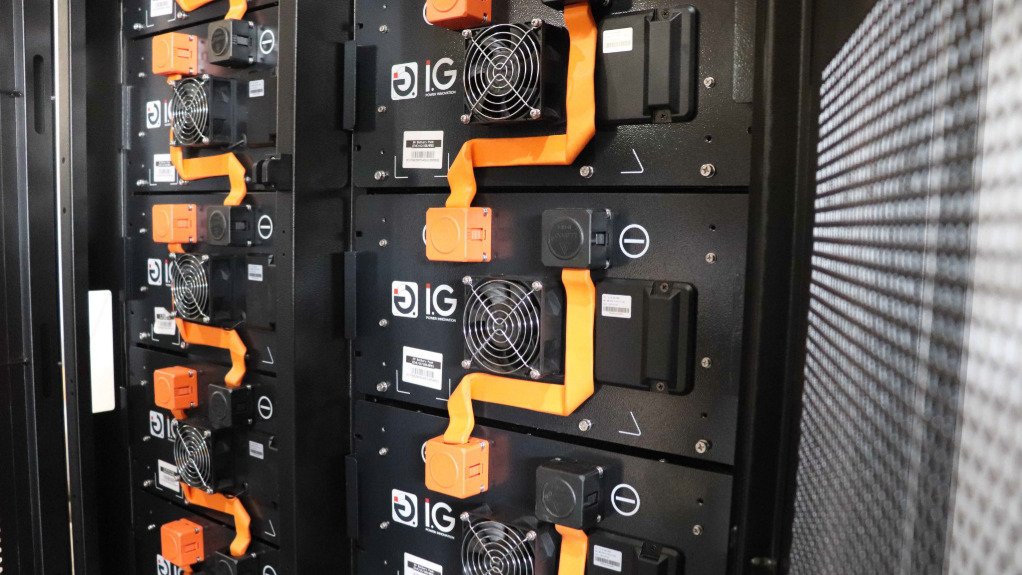With the South African government's Integrated Resource Plan encouraging renewable-energy integration, battery energy storage systems (BESS) are becoming a critical component in the country’s energy mix, supporting grid-tied and off-grid installations, says energy solutions specialists I-G3N technical manager Taole Tsoehlisi.
The adoption of BESS in the country is growing, driven by the need to stabilise the grid and provide backup power during loadshedding.
Energy storage solutions are actively being implemented in commercial, industrial and residential sectors, and industrial customers can benefit from peak shaving, demand response and ensuring uninterrupted power supply during outages, Tsoehlisi adds.
“At I-G3N, we have seen increased demand for energy storage as businesses and communities aim for energy independence and resilience, particularly in regions where grid instability persists,” he says.
Further, advancements in BESS technology, such as better thermal management and improved active balancing mechanisms, allow for more benefits, extending its longevity and enhancing its reliability.
Enhancements in battery management systems ensure even cell use, preventing overcharging or deep discharging, which can shorten battery life.
Tsoehlisi highlights that innovations in cooling, such as liquid cooling and advanced thermodynamic channelling, ensure optimal operating temperatures, reducing thermal stress and extending battery life span.
“Active balancing has also been crucial in ensuring that all cells within a battery pack age evenly, minimising the risk of premature failure,” he adds.
Another significant improvement that I-G3N has introduced into its solutions is remote monitoring technology, which enables clients to track the performance of their BESS in real time. This ensures proactive maintenance and early identification of issues before they result in system failure, thereby reducing downtime and increasing system reliability.
Tsoehlisi says these advancements significantly improve long-term performance while increasing the viability of BESS for large-scale applications such as utility storage and industrial use.
I-G3N is also exploring battery recycling solutions and second-life applications for used batteries; this ensures that the environmental impact of its products are minimal and that the company helps contribute to a circular economy.
Energy Management Systems
In South Africa, challenges such as the intermittent nature of renewable energy, persistent power cuts and the rising cost of electricity underscore the need for better energy management, Tsoehlisi says.
Inefficiencies, owing to insufficient power consumption management, alongside varying tariff schedules, have led to higher costs and operational issues.
I-G3N, therefore, developed and integrated advanced energy management systems into its BESS solutions, providing real-time data monitoring, predictive maintenance and optimisation to ensure greater reliability and performance.
The integration of such systems into BESS is “increasingly important for improving efficiency, control and automation of energy distribution within storage systems”.
Tsoehlisi adds that I-G3N’s energy management systems enable plant managers to integrate and control additional equipment, such as fire suppression systems, security and backup generators, along with heating, ventilation and air conditioning.
Coupled Approach
Power purchase agreements (PPAs) are significant in supporting renewable-energy projects, offering long-term contracts at fixed rates, which provide financial stability and predictability, Tsoehlisi says.
BESS enhance PPA terms, as they can ensure stable energy supply despite the intermittency of renewable sources. The integration of storage into PPAs is increasingly used in Africa to help stabilise energy costs, reduce reliance on fossil fuels and reduce the impact of initial capital costs associated with BESS, he explains.
Further, power wheeling allows for new possibilities for energy distribution across South Africa, as independent power producers and companies with renewable-energy systems can sell their excess power, consequently creating new revenue streams and promoting decentralised energy distribution.
Power wheeling not only allows for electricity to be transmitted from generation points to different locations using the national grid; coupled with BESS, it also allows for energy to be stored at off-site locations and distributed during peak demand times when prices are higher, optimising financial returns.
This is particularly beneficial for large-scale renewable-energy projects that can store energy during low-demand periods and distribute it to areas or facilities during periods of high demand, Tsoehlisi concludes.
Edited by: Nadine James
Features Deputy Editor
EMAIL THIS ARTICLE SAVE THIS ARTICLE
ARTICLE ENQUIRY
To subscribe email subscriptions@creamermedia.co.za or click here
To advertise email advertising@creamermedia.co.za or click here













